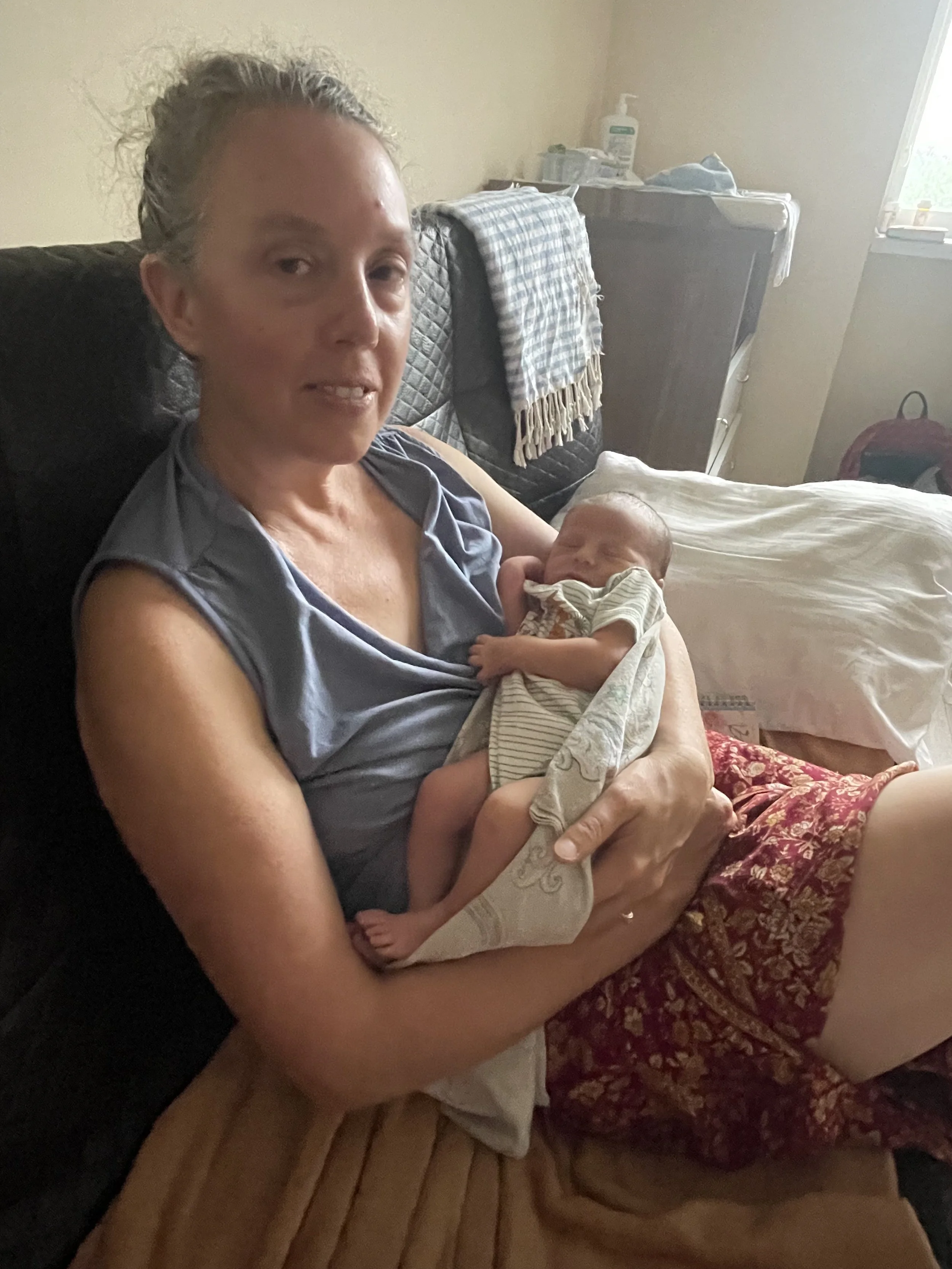Becoming a postpartum doula
A month or two after our surrogate in Georgia became pregnant, I reached out to my dear friend Jenevieve Russell who I had known for over 20 years and who is a doula. She was so supportive and encouraging about our later in life journey to have a child together, and I asked her to help me plan a mother’s blessing ceremony around the 120th day of pregnancy, which is a tradition in the yogic community I have been a part of. That gathering was so lovely and nourishing (see my blog post about it here), and it helped to make the reality of what was happening sink in. As the pregnancy progressed, and I started to think more about preparing for the birth of our son, I joined an online summit on pregnancy, birth, infancy, and parenting from a neuroscience approach, and realized I really needed support to prepare for what was about to happen. During the summit, the idea of a postpartum plan, and a postpartum doula, was presented, and I decided that would be just the thing I needed…and that I knew just the person to ask! Jenevieve graciously said she would be happy to support my husband and me in this way, and we began to plan what that would look like. In the process, she sent me a video she had made, and shared a postpartum plan template she had created. Of course, those resources were geared towards pregnant and birthing mothers, so I had to translate and modify them to fit our situation. We started meeting with her monthly to get support in filling out the postpartum plan, and in the process we began some very helpful discussions around several important topics, including: how to ensure we each got enough rest; who our support network would include, both in Tbilisi and once we were home in Colorado; how to make sure we got time for self care and exercise; our plan for meals/laundry/errands/cleaning; ways to stay connected as a couple, etc. In each area, we developed plans A, B and C…what our best case scenario was, then if that didn’t work, other ideas and options. Jenevieve offered suggestions based on her extensive experience supporting new families, which was so helpful, since we didn’t know what we didn’t know! Basically, we were talking about ensuring that the essentials needed for us as parents to be well - physically, emotionally, mentally, spiritually - would be in place. Because as we were learning, this is what would set us up to best be able to bond with our new baby. High stress hormones like cortisol leads to low oxytocin and less ability to bond. Less stress = lower cortisol = more oxytocin = more bonding. If we were in survival mode, in fight or flight, our baby would have a harder time co-regulating with us and would also be more likely to be in fight or flight himself. We discussed how in the beginning, the quantity of quality time needed to be high, especially since we were making up for lost time during those 9 months of gestation. And we learned about Kangaroo care, the importance of skin to skin time immediately after the birth, and talked about elimination communication, baby wearing, cloth versus disposables, and all the other conversations that were best had before baby arrived. Jenevieve supported and encouraged us, provided information and education, and gave us a sounding board.
All of this was so that our little guy, who we had worked so hard for and waited so long for, would feel welcomed by parents who were prepared, supported, and ready.
Our baby arrived 3 weeks early, just a day after we had arrived in Georgia. So some of our best laid plans (learn about all the local grocery stores, practice using the washing machine) were not possible. But when I held that little angel in my arms and cried and sang to him and held him skin to skin, I was incorporating those things that I had learned. And when I was panicked that something was wrong with the plates of his skull, Jenevieve was there on a video call to talk me down (he was totally fine and normal). She also connected us to an online newborn parents group which was a much needed community since we were out of the country; and met with us online a few weeks after his birth to check in and see how we were doing and what we needed. We felt so held by her, and grateful for her support and presence - even though she was thousands of miles away, and never held him or cooked a meal for us…she provided support in countless other ways, and helped us learn to create a village for ourselves.
And so, a year later, as I sat in a field surrounded by aspen trees overlooking the continental divide in the mountains of Colorado, I decided I wanted to offer a similar service to other intended parents. Which is where this new role of Intended Parents Support Coach grew from. And a year after that, I decided to take a postpartum doula training course, to get the training which would help me do so.
In August 2025, I completed the 18 hours of in person instruction that becoming a certified postpartum doula requires, in a hospital conference room in Denver. Where, quite magically, there was a beautiful painting of a field surrounded by aspen trees overlooking tall peaks.
Next comes the extensive reading, essay writing, and exams. As well as, working with 3 different families in the postpartum time, taking an infant CPR course, and gathering letters of recommendation from professionals in the birth field. So that will be a journey that will take up the next year or so to become fully certified.
As I was talking with Jenevieve about my idea to embark upon a postpartum doula training, she pointed out that the word doula comes from the Greek, meaning female servant or slave. So a more appropriate term might be: postpartum care provider or professional. And so I developed this mission statement:
I am a postpartum care provider and Intended Parents Support Coach supporting intended parents, new parents, and families to feel prepared and nurtured, and unborn and newborn babies to feel welcomed and loved.
As doulas, we are not nannies, or chefs, or housecleaners, or nurses; we nurture the parents and the new baby, educate the family, provide emotional support, assess potential needs and problems, and connect families to the resources they need. As part of our doula certification, we create an extensive list of resources and referrals for online and local support - everything from nannies and housecleaners, to lactation consultants and infant bodyworkers. When mom and baby are supported well, right from the beginning, the likelihood of complications, and the need for intervention, go way down. And the likelihood of maternal and infant well-being goes way up. More support = less cortisol = more oxytocin = more bonding = happier and healthier parents and babies!
At lunchtime on the first day of the training, I was inspired to look back through photos of Remi’s birth and the immediate postpartum time. I cried, and was reminded of how strong the emotions were, and how much love (and fear, and anxiety, and exhaustion) I felt. I felt a renewed commitment to support others to have a nurtured experience as they become parents, whether through surrogacy, egg/embryo/sperm donation, IVF, or later in life. Remembering how intense it was emotionally - the highs and lows, anxiety, vigilance - and what it was like to fall in love with this new little being I had never met before…my mission was strengthened: to help babies born through non-traditional means feel that their parents are supported, prepared, and ready to welcome them in their arms with so much love.

